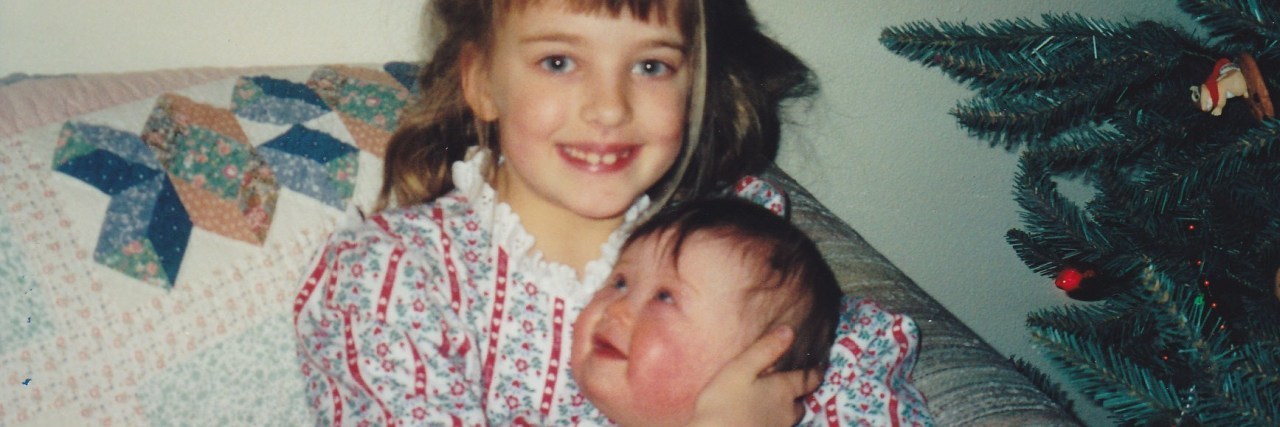My Sister With Down Syndrome Increased My Family's Capacity to Love
When I was in third grade, my teacher assigned a heritage project in which we researched our ancestry, wrote a paper on our findings and brought some kind of cultural dish to share with the class. As a 9-year-old I was intrigued to learn Iceland was not a country made entirely of ice, but was actually where my ancestors had originated from. As somewhat of a (yes, I’ll admit it) pretentious kid, I was delighted to learn Iceland had nearly 100 percent literacy. I smugly asked my classmates, “What literacy rate does your country have?” and smirked at their paltry low 90s answers.
At home that night, as my mother dished up the leftovers of the traditional “vinarterta” cake we had made together, my 2-year-old sister with Down syndrome played on the floor nearby.
Grace was born when I was 6, so I can’t remember a time when I hadn’t heard the term “Down syndrome.” She seemed as natural to my life as my neurotypical brother. Only as I grew older that I realized, through fleeting moments, many in society saw her as anything but normal — a boy sneering the word “r*t*rd” at a classmate during gym class; my mother crying in the kitchen after an IEP meeting; the fact that all my friends’ toddler siblings were running around while my sister contentedly sat on the floor. By middle school, though no one had specifically bestowed this responsibility on me, I knew deep in my bones I would need to be my sister’s ally and advocate for life.
This advocacy was felt most deeply many years later when I became pregnant with my daughter and joined an expectant moms’ group on social media. Everyone groaned over morning sickness together, and as time went on, we giddily shared pictures of our growing bumps and first ultrasounds. I was absentmindedly scrolling through my feed when my eyes caught the words “Down syndrome” and my heart skipped a beat. A woman in the group had an amniocentesis test done, which delivered a diagnosis with 99 percent surety of the extra chromosome. The comments were sympathetic, “Oh no, I’m so sorry! We are here for you, sweetie!” and somewhat misguided “Those tests aren’t always right!” My fingers were shaking as I typed out a long message, sharing my story with her of how much joy my sister brought to my life, my family and my community. I added a link to Emily Perl Kingsley’s “Welcome to Holland,” a short story that has become a staple in some parenting disability communities, and I told her to please message me with any questions. Later that night, she responded she was happy my sister had a good life, but she couldn’t imagine being strong enough to deal with it all.
It breaks my heart she was convinced this baby, for whom she had been so excited only days earlier, was as good as lost to her. Nothing she had seen in her life showed her people with intellectual disabilities had lives worth living.
My mind wandered back to the summer of 2009, when I went with my parents to Kiev, Ukraine, to adopt another child with Down syndrome. Whereas Iceland is driven by the pursuit of knowledge and education, Ukraine had an atmosphere blending indulgence with deeply-held religion, as demonstrated by the pin-up girls keeping company with St. Jude on almost every taxi driver’s dashboard. My first day in Kiev, I accompanied my parents to the courthouse where they petitioned to adopt little Bogdana. Through an interpreter, the judge skeptically asked my parents, “Are you adopting her to look for a cure?” He, too, did not see the worth of people with disabilities since they are rarely seen in public in his country (institutionalized, rather than aborted, due to inaccessibility of prenatal testing).
Over the years, my parents adopted two more children with Down syndrome, Novak from Serbia and Simas from Lithuania. My family is quite a sight to behold when we are all out and about together, regardless of where we go. I can only imagine how that would be amplified in Iceland — seeing not just one child with Down syndrome, but four.
Though the news from CBS on Iceland is soul-chilling, especially to those of us who know and love someone with an extra chromosome, it is not without hope. Nelson Mandela once said, “No one is born hating another person because of the color of his skin, or his background or his religion.” In the same way, we are not born hating someone because of their disabilities. For the 16 months since her birth, my daughter has never known a life without four doting aunts and uncles with Down syndrome, swarming around her every time we walk through the door. Her face lights up with pure joy and her tiny hands reach out for hugs. I know in the coming years she will learn, just as I did, that not everyone unabashedly embraces and accepts our family the way she does. People have been taught through their limited experiences that having a child with a disability is to be feared.
However, Mandela’s quote goes on: “People learn to hate, and if they can learn to hate, they can be taught to love, for love comes more naturally to the human heart than its opposite.” I dream of one day traveling with my siblings, especially Grace, to Iceland, to the place of our heritage. Though I will always be here to stand up for her, she would not need any help from me in teaching Icelanders what they have not had the opportunity to see to this point: that disability does not equal inability, that a person’s value goes beyond their capacity for knowledge and Down syndrome cannot create a gap insurmountable by a family’s love.
We want to hear your story. Become a Mighty contributor here.

